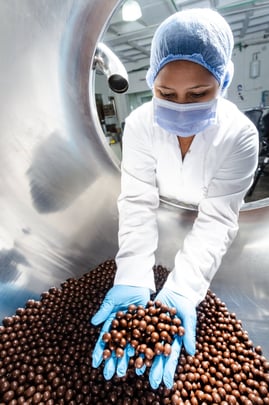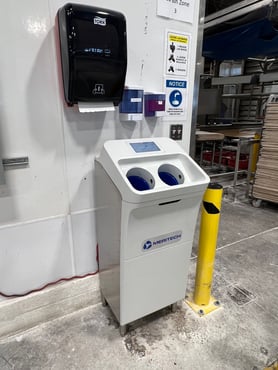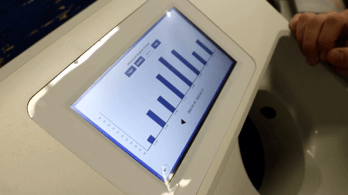5 Ways to Establish a Food Safety Culture at Your Food Processing Facility
In today's world, food safety must be a top priority for every food processing facility. A strong food safety culture is no longer an option but a necessity. It not only protects your customers from foodborne illnesses but also safeguards your reputation as a business. By following the five tips mentioned below, you can create a solid food safety culture that instills confidence in your customers and keeps your business thriving.
1. Train Your Staff to Prioritize Food Safety Culture
 Ensuring that your food is safe for consumption is not only a legal obligation but also an ethical responsibility that every food processing facility should take seriously. As a food safety manager, it is your duty to train your staff on the basic principles of food safety, including proper handling, storage, and sanitization techniques. By investing in their education, you'll be empowering them to make informed decisions that can prevent foodborne illnesses and protect your customers' health.
Ensuring that your food is safe for consumption is not only a legal obligation but also an ethical responsibility that every food processing facility should take seriously. As a food safety manager, it is your duty to train your staff on the basic principles of food safety, including proper handling, storage, and sanitization techniques. By investing in their education, you'll be empowering them to make informed decisions that can prevent foodborne illnesses and protect your customers' health.
Learn how to utilize food safety
culture training resources
Moreover, keeping your staff up-to-date with the latest food safety regulations and trends in the food industry is essential for maintaining a strong food safety culture. Regular training sessions and informational meetings can help your team stay informed and engaged, and improve their ability to identify potential hazards and mitigate risks. By fostering a culture of continuous learning, you'll be demonstrating your commitment to excellence and earning the trust and loyalty of your customers.
2. Develop an Effective Food Safety Culture Strategy
Developing a comprehensive food safety plan is the foundation of any successful food business. This means going beyond simply identifying potential hazards and assessing their likelihood. You must also evaluate the impact of these hazards on your customers and your business, from financial losses to negative publicity. This holistic approach allows you to develop effective strategies to prevent, eliminate, or minimize risks and hazards, and include preventive controls in your plan.
Learn how to create a food safety culture plan
Your food safety plan should not be a one-time effort, but a living document that evolves with your business. As you introduce new products, processes, or equipment, you must assess their impact on your food safety culture and adjust your plan accordingly. This requires ongoing communication and collaboration between all members of your team, from the front-line staff to the management.
3. Maintain a Clean and Healthy Work Environment to Promote Food Safety Culture
-1.jpg?width=317&height=211&name=AdobeStock_201809925%20(3)-1.jpg) Ensuring a spotless and germ-free environment is paramount for any food establishment. Not only does it prevent the spread of harmful pathogens that can cause foodborne illnesses, but it also ensures that your customers are satisfied with the cleanliness of your establishment. To achieve this, it's important to train your staff on proper cleaning and sanitization techniques for all areas of your facility, including the production areas, hygiene zones, and restrooms. Establishing a regular cleaning schedule and holding your staff accountable for its completion is also essential to keep things running smoothly and prevent any areas from becoming neglected.
Ensuring a spotless and germ-free environment is paramount for any food establishment. Not only does it prevent the spread of harmful pathogens that can cause foodborne illnesses, but it also ensures that your customers are satisfied with the cleanliness of your establishment. To achieve this, it's important to train your staff on proper cleaning and sanitization techniques for all areas of your facility, including the production areas, hygiene zones, and restrooms. Establishing a regular cleaning schedule and holding your staff accountable for its completion is also essential to keep things running smoothly and prevent any areas from becoming neglected.
Check out our Food Safety and Sanitation Checklist
When designing your space, it's important to keep cleanliness and hygiene in mind. Ensure that your facility has adequate drainage systems to prevent water buildup and the growth of bacteria. Surfaces should be easy to wipe down and sanitize, and any equipment should be regularly maintained to prevent the accumulation of dirt and grime. Proper ventilation is also important to ensure that the air quality in your facility is high and to prevent the spread of airborne pathogens.
4. Promote Good Hygiene Practices for a Strong Food Safety Culture
Maintaining proper hygiene standards for your staff is vital to ensure the safety of your customers and the success of your business. It's important to emphasize the importance of frequent handwashing techniques with soap and water, especially before and after handling food, after using the restroom, and after coughing or sneezing.
 Incorporating CleanTech® Automated Handwashing Stations into your facility not only promotes hygiene but also provides your employees with optimal pathogen removal in just 12 seconds. This innovative technology helps to ensure that your staff maintains the highest standards of cleanliness, which can prevent the spread of harmful pathogens and protect the safety of your staff and customers.
Incorporating CleanTech® Automated Handwashing Stations into your facility not only promotes hygiene but also provides your employees with optimal pathogen removal in just 12 seconds. This innovative technology helps to ensure that your staff maintains the highest standards of cleanliness, which can prevent the spread of harmful pathogens and protect the safety of your staff and customers.
Learn more about automated
hygiene for food safety
Furthermore, it's important to encourage your staff to stay home when feeling unwell, especially if they exhibit symptoms of a foodborne illness. This can prevent the spread of germs and protect your customers from getting sick. Making sure that personal protective equipment (PPE), such as gloves and masks, are properly stocked can also help keep them safe and healthy while on the job.
5. Evaluate the Effectiveness of Your Food Safety Culture Program
Regularly assessing the effectiveness of your food safety program is crucial. By keeping meticulous records of food safety activities, audits, and inspections, you can identify areas that need improvement and make necessary changes to your food safety plan. Conducting regular internal audits can help you assess your food safety culture and ensure that your staff is following the proper protocols.
 CleanTech® Automated Handwashing Stations also track important compliance data. This data can help identify areas where additional training or support may be needed, especially in specific shifts. By having this valuable information at your fingertips, you can ensure that your staff are following proper protocols and maintaining a strong food safety culture.
CleanTech® Automated Handwashing Stations also track important compliance data. This data can help identify areas where additional training or support may be needed, especially in specific shifts. By having this valuable information at your fingertips, you can ensure that your staff are following proper protocols and maintaining a strong food safety culture.
Download our Hand Hygiene Audit Tool
It's also important to stay up-to-date with the latest industry trends and regulatory requirements to ensure that your food safety plan remains effective. As new risks and hazards emerge, you must adapt your plan accordingly to maintain the safety of your customers and your business's reputation. By consistently reviewing and updating your food safety plan, you can stay ahead of potential issues and maintain a strong food safety culture that safeguards your customers, your staff, and your business. Remember, a strong food safety culture is not a one-time effort but a continuous process of improvement and adaptation.
Learn how to improve food safety culture with automated hygiene






